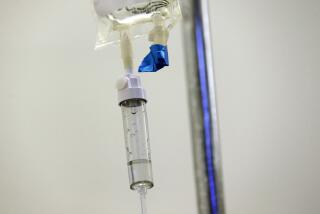Ruble Troubles Prompt ICN to Halt Output in Russia
- Share via
ICN Pharmaceuticals Inc., the biggest drug maker in Eastern Europe, said it will suspend production at its five Russian plants for 20 days beginning on Christmas Day because the slumping Russian ruble has slashed consumers’ purchasing power.
“Our warehouses are filled with medicine that can’t be sold,” said company spokesman Sergei Korol. “Consumer spending has dropped and the distribution system has collapsed.”
The ruble has tumbled 69% since August, and Korol said distributors owe ICN $34 million for previous supplies.
Costa Mesa-based ICN said sales of drugs produced in Russia will rise to about $215 million this year from $150 million last year, but will still fall about 20% below expectations.
ICN spokesman Terry Souers said the company still believes that its long-term prospects for growth are excellent in its Russian and European markets. He noted that the Russian financial crisis has triggered a falloff in imports from other drug companies, giving ICN an opportunity to expand into the vacuum.
He said the production shutdown will give the company a chance to reduce inventories, repair factory equipment and adjust its sales approach to difficult market conditions.
ICN owns controlling stakes in five Russian plants, including ICN Oktyabr in St. Petersburg, which was founded by Peter the Great in 1714. It also has bought a major former Soviet drug distributor.
Recently, ICN put on hold plans to buy two more plants in Russia.
The company has begun buying pharmacies to cut out failing distributors. ICN has about 40 pharmacies and hopes to own about 100 next year, said Mikhail Sapovsky, vice president for Russia.
ICN reported a third-quarter pretax loss of $75 million in Eastern Europe. Third-quarter sales in the region declined 34% to $65 million from $99 million in the third quarter of 1997.
In October, ICN’s Belgrade unit, Yugoslavia’s largest private employer, announced plans to cut its work force by a third because of currency devaluations.
The unit also stopped selling medicine to the Yugoslav government, which fell behind in payments to the company for drug supplies to state hospitals and other institutions.
ICN’s products include medicines produced under license from companies such as Roche Holding AG, a Swiss drug maker, and include a cardiovascular drug, a central nervous system disorder drug and dermatology products as well as ICN’s proprietary antiviral drug for a respiratory virus.
The company also has licenses to manufacture drugs developed by Eli Lilly, Schering Plough and Bristol-Myers Squibb Co.
ICN’s stock closed Tuesday at $21.88, up $1 a share.
More to Read
Inside the business of entertainment
The Wide Shot brings you news, analysis and insights on everything from streaming wars to production — and what it all means for the future.
You may occasionally receive promotional content from the Los Angeles Times.










